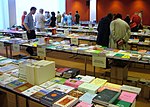language in Dr. Esperanto's International Language (Esperanto: Unua Libro), which he published under the pseudonym Doktoro Esperanto. Early adopters of...
166 KB (16,696 words) - 09:52, 28 December 2024
L. L. Zamenhof (redirect from Doktoro Esperanto)
was the creator of Esperanto, the most widely used constructed international auxiliary language. Zamenhof first developed the Esperanto language in 1873...
45 KB (4,173 words) - 13:38, 26 December 2024
Native Esperanto speakers (Esperanto: denaskuloj or denaskaj esperantistoj) are people who have acquired Esperanto as one of their native languages. As...
15 KB (1,911 words) - 23:10, 12 December 2024
Esperantujo (redirect from Esperanto community)
or Esperantio (IPA: [esperanˈtio]) is the community of speakers of the Esperanto language and their culture, as well as the places and institutions where...
30 KB (3,336 words) - 12:58, 20 November 2024
Esperanto symbols, primarily the Esperanto flag, have seen much consistency over the time of Esperanto's existence (namely in the consistent usage of the...
8 KB (964 words) - 04:02, 24 November 2024
Esperanto is the most widely used constructed language intended for international communication; it was designed with highly regular grammatical rules...
67 KB (8,935 words) - 03:31, 29 October 2024
The Esperanto Wikipedia (Esperanto: Vikipedio en Esperanto, IPA [vikipeˈdio en espeˈɾanto] or Esperanta Vikipedio [espeˈɾanta vikipeˈdio]) is the Esperanto...
13 KB (1,064 words) - 07:28, 18 December 2024
Esperanto or esperanto in Wiktionary, the free dictionary. Esperanto is an international auxiliary language. Esperanto may also refer to: Esperanto (magazine)...
1 KB (129 words) - 04:42, 30 June 2024
developed Esperanto in the 1870s and '80s. Unua Libro, the first print discussion of the language, appeared in 1887. The number of Esperanto speakers have...
30 KB (3,867 words) - 23:32, 15 October 2024
Esperanto is written in a Latin-script alphabet of twenty-eight letters, with upper and lower case. This is supplemented by punctuation marks and by various...
31 KB (3,513 words) - 14:11, 11 October 2024
are available in the Esperanto language. The phrase "Esperanto music" is sometimes used to include music which is about Esperanto. Lou Harrison, who incorporated...
4 KB (352 words) - 00:21, 27 December 2024
The Esperanto movement, less commonly referred to as Esperantism (Esperanto: Esperantismo), is a movement to disseminate the use of the planned international...
2 KB (200 words) - 19:40, 27 October 2024
The Universal Esperanto Association (Esperanto: Universala Esperanto-Asocio, UEA), also known as the World Esperanto Association, is the largest international...
27 KB (3,535 words) - 10:56, 15 November 2024
The original word base of Esperanto contained around 900 root words and was defined in Unua Libro ("First Book"), published by L. L. Zamenhof in 1887...
63 KB (5,600 words) - 01:04, 9 November 2024
transcription delimiters. Esperanto is a constructed international auxiliary language designed to have a simple phonology. The creator of Esperanto, L. L. Zamenhof...
45 KB (5,018 words) - 22:04, 21 December 2024
References to Esperanto, a constructed language, have been made in a number of films and novels. Typically, this is done either to add the exotic nature...
25 KB (3,395 words) - 05:08, 8 December 2024
Esperanto II or Esperanto 2 was a reform of Esperanto proposed by René de Saussure in 1937, the last of a long series of such proposals beginning with...
13 KB (1,276 words) - 08:17, 23 August 2024
An Esperantist (Esperanto: esperantisto) is a person who speaks, reads or writes Esperanto. According to the Declaration of Boulogne, a document agreed...
12 KB (1,413 words) - 12:05, 11 November 2024
Esperanto culture refers to the shared cultural experience of the Esperantujo, or Esperanto-speaking community. Despite being a constructed language,...
18 KB (2,251 words) - 03:08, 1 December 2024
The World Esperanto Congress (Esperanto: Universala Kongreso de Esperanto, UK) is an annual Esperanto convention. It has the longest tradition among international...
17 KB (535 words) - 10:55, 15 November 2024
Proto-Esperanto (Esperanto: Pra-Esperanto) is the modern term for any of the stages in the evolution of L. L. Zamenhof's language project, prior to the...
11 KB (1,348 words) - 07:12, 26 October 2024
Esperanto vocabulary and grammatical forms derive primarily from the Romance languages, with substantial contributions from Germanic languages. The language...
26 KB (3,034 words) - 20:54, 15 March 2024
Esperanto Filmoj is a Mexican-American film and television production company based in Sherman Oaks, California. It is owned by film director Alfonso...
4 KB (302 words) - 07:31, 18 December 2024
Literature in the Esperanto language began before the first official publication in Esperanto in 1887: the language's creator, L. L. Zamenhof, translated...
5 KB (502 words) - 05:25, 28 February 2024
The following is a list of Esperanto-language films including features and documentaries. Esperanto was created in the late 1870s and early 1880s. There...
15 KB (1,751 words) - 13:58, 17 April 2024
Esperanto Day (Esperanto: Esperanto-Tago) is a worldwide observance on 26 July, which celebrates the publication of Unua Libro, the first book in the...
1 KB (95 words) - 14:13, 28 October 2024
Esperanto (exact name Esperanto.4733) is a computer virus that appeared in 1997, named for the constructed language Esperanto. The program's name was...
3 KB (350 words) - 18:56, 2 December 2023
Esperanto in Japan (in Japanese: 日本のエスペラント) dates back to the 19th century. Esperantists briefly increased in Japan in the 1880s, along with the interest...
2 KB (198 words) - 13:28, 27 October 2024
The Akademio de Esperanto (AdE; English: Academy of Esperanto) is an independent body of Esperanto speakers who steward the evolution of said language...
4 KB (358 words) - 20:11, 12 November 2024
the letters in the Esperanto alphabet that have diacritics, as well as a number of graphic work-arounds. The diacritics of Esperanto were designed with...
11 KB (1,232 words) - 12:30, 7 April 2024










